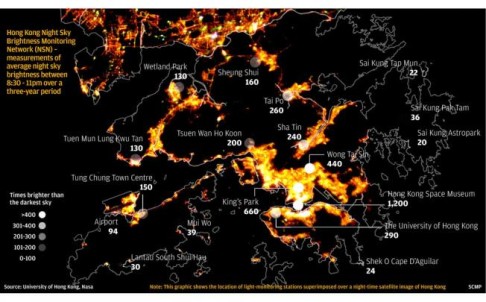Strike a light: Hong Kong task force shelves legislation on light pollution
Advisers shy away from legislative approach taken overseas to curb light pollution, saying there is no 'majority' opinion on the issue
Hong Kong should not yet follow London, Sydney and Shanghai by imposing laws to tackle light pollution, government advisers say.
Even though previous studies found the problem worse here than anywhere in the world, they propose a "less draconian" approach of asking businesses to voluntarily switch off lights at preset times.
The Task Force on External Lighting stressed that it was necessary to strike a balance between commercial viability, nuisance to residents, the impact on the tourism sector and even safety.
In a report submitted to the government yesterday, the 14-member group said the idea of a voluntary charter scheme would be the more pragmatic approach to deal with problems associated with external lighting. It stressed that future legislation was not being ruled out.
"It is a less draconian measure that will be more palatable to the business sector and can help promote adoption of good practices," the report read.

Task force chairman Dr Albert Chau Wai-lap said divergent views from the consultation produced no "majority" opinion, suggesting the community was not ready for rigorous regulation such as legislative control.
The spectrum of views ranged from wanting immediate legislation to objection to any form of regulation, Chau said. But "the outcome clearly indicates a genuine need … to address the problems of light nuisance and energy wastage caused by external lighting".
Chau said legislation was "not out the window" but the government could first monitor the effectiveness of the charter for two years, while it made preparations for possible draft legislation.
The scheme would require businesses who take part to switch off all external non-static lights used for decoration, promotion or advertising, as well as rooftop signs, after 11pm, or, in some busy districts, by midnight.
There would be exemptions for businesses that needed to operate for longer hours and signs on ground-floor shops that stayed open after the agreed time. Decorative lighting for festive holidays, safety and security purposes would also be exempt.
Chau said it was not up to the task force to speculate how effective the scheme would be, but appropriate incentives would be provided to attract participants.
Green Sense chief executive Roy Tam Hoi-pong said the report was disappointing. "It won't be effective if the authorities cannot issue warnings or penalties for those who breach the requirements," he said.
Task force member Edwin Lau Che-fung, who is also head of community engagement at Friends of the Earth, said he still felt legislative control was the ultimate goal, but admitted the process could be complex.
Environment minister Wong Kam-sing said he would study the recommendations carefully.

